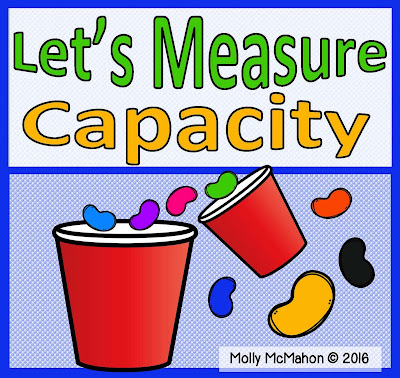I have a center idea for measuring capacity with nonstandard units. A teacher's assistant or a parent volunteer can manage the area for you once you've set things up. It's best of have only 1 or 2 children use the center at a time. This way, every child gets "HANDS ON" practice with measuring the capacity of an 18 ounce cup.
There's also a FREEBIE that you can use along with the activity. It's at the end of this post.
The children will not be using the term, "ounces" for this activity. They'll refer to the 18 ounce cup as the "big cup" and the 3 ounce cup as the "small cup". They are measuring the capacity of the 18 ounce cup in terms of the number of small cups used to fill the "big cup".
You'll need:
1. Large bowl
2. 18 ounce cup,
3. 3 ounce cup
4. one other sized cup (It should divide evenly into 18 such as a 1, 2, 6, or 9 ounce cup.)
5. Jellybeans or Uncooked kidney beans
6. Cookie tray to keep beans from rolling off of the table.
* You'll need enough jellybeans/kidney beans to fill the 18 ounce cup.
Make sure that you do not have students who have allergies to ingredients in jellybeans. Consider the flavors as well. If you have a student that has a strawberry allergy, don't use strawberry jellybeans.
The jellybeans used in this activity are for measuring purposes only. The children will be handling the jellybeans. Therefore, NO EATING ALLOWED!
Place the 3 ounce cup in the bowl.
The children fill the 3 ounce cup with jellybeans.
They pour the jellybeans from the 3 ounce cup into the 18 ounce cup. They repeat until the 18 ounce cup is filled with jellybeans. When one cup of jellybeans is added to the 18 ounce cup, they count it. They tally their count on the freebie sheet.
The children can measure the capacity of the large cup a second time using a different unit of measurement. In the photo above, I am using a 2 ounce cup which will go into the 18 ounce cup evenly. (9 times) Use a permanent marker and mark the 2 ounce cup with an "X" so that students can distinguish it from the 3 ounce cup.
Students can use the printable to record their measuring results.
Are you looking for more ideas on how to teach capacity? Here's a list of free-flowing solids that can be used for measuring:
1. Sand
2. Rice
3. Wild bird food
4. Uncooked kidney beans
5. Jellybeans
6. Salt
7. Sugar
8. Small buttons
9. Pony beads
10. Dried watermelon seeds
11. Dried pumpkin seeds
12. Sunflower seeds
You might also like my previous post.
The capacity printable will provide you the option of using jellybeans or kidney beans. View the table of contents when you download it. Get the FREEBIE by clicking the image shown below. That's it for now!
Lessons by Molly © 2016 All rights reserved.








No comments:
Post a Comment